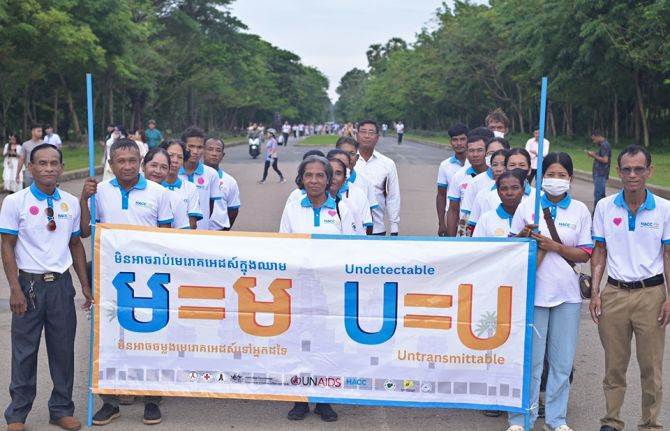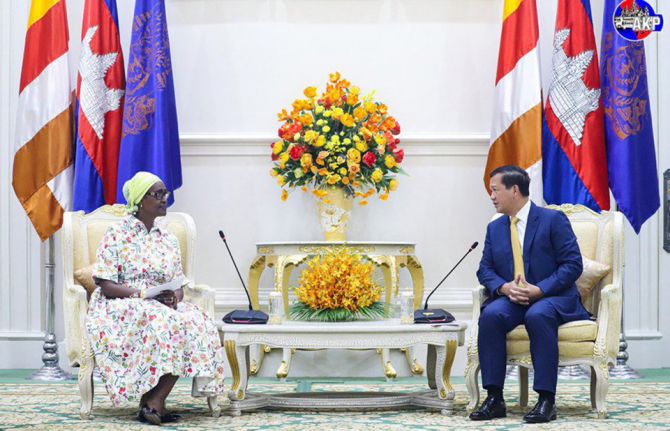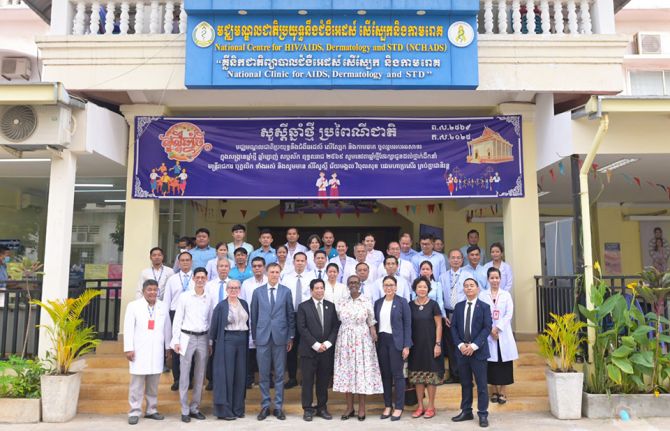



Press Release
Cambodia showcases huge progress towards ending AIDS, announces a financial contribution to UNAIDS
16 May 2025 16 May 2025PHNOM PENH, 16 May 2025—UNAIDS Executive Director, Winnie Byanyima, saw firsthand Cambodia’s strong progress towards ending AIDS as a public health threat during her 12-16 May mission. Among other achievements, the country treats 100% of people who are aware of their HIV status. Key approaches include national roll-out of modern HIV prevention and treatment tools, community-led service delivery and social protection. During the visit she discussed the sustainability of the response with the Royal Government and partners.
“Cambodia’s HIV response demonstrates that ending AIDS is possible for low- and middle-income countries when we combine political will, community leadership and international support,” Ms Byanyima said.
Cambodia is on track to achieve the 95-95-95 Global AIDS Strategy targets. Currently 92% of people living with HIV are aware of their status. Almost all diagnosed people are on treatment, while more than 98% of those on treatment have achieved a suppressed viral load. Since 2010, new infections have decreased by 45%. This is higher than the overall global results and more than three times faster than the average Asia-Pacific rate of decline.
The country employs a multisectoral approach that includes social assistance and free healthcare access for people living with HIV and key populations. It has also prioritized peer- and community-led voluntary counselling and testing, adherence support and prevention services. To achieve and sustain epidemic control there must be continued investments, including increased domestic financial ownership of the response.
H.E. Prime Minister Samdech Thipadei Hun Manet thanked the United Nations for its support of Cambodia’s socio-economic development and expressed appreciation for UNAIDS’ active role in strengthening its HIV response.
“When we talk about building human capital, we must pay attention to the health of the people,” he said.
Prime Minister Hun Manet stressed the importance of deepening this cooperation and partnership while announcing a new financial contribution to UNAIDS.
“This contribution is symbolic of the importance Cambodia places on UNAIDS, the HIV response, and the multilateral system,” Ms Byanyima said. “It sends a signal to donors and to other Association of Southeast Asian Nations countries about the importance of continued investment in ending pandemics.”
In a meeting with the UNAIDS Executive Director, community representatives called for continued funding for people-centered strategies, as well as support to end stigma and discrimination.
Ms Byanyima’s mission included a visit to the National Clinic for AIDS, Dermatology and Sexually Transmitted Diseases in Phnom Penh. The clinic is a model for service integration and community-led care. Open seven days a week, it provides peer-led counseling, testing and treatment for HIV and sexually transmitted infections, non-communicable disease services, mental health screening and multiple pre-exposure prophylaxis (PrEP) options. PrEP is the use of antiretroviral therapy by HIV-negative people to avoid contracting the virus if exposed.
In Siem Reap, Ms Byanyima joined the Health Action Coordinating Committee and Joint Forum of Networks of People Living with HIV and Key Populations awareness raising campaign on U=U (undetectable equals untransmittable). U=U refers to the scientific fact that people living with HIV who have an undetectable viral load through successful treatment have zero chance of passing the virus to a sexual partner. Cambodia has embraced this concept to not only increase treatment adherence but also stop stigma and discrimination against people living with HIV.
“HIV cannot harm us if we take our ARV medication correctly, regularly, and consistently,” said Sorn Vichheka, Coordinator of the Cambodian Community of Women Living with HIV at the U=U event. “When our viral load is undetectable, we cannot transmit the virus to our partners. This means we can live freely—we can dream, work, love, have families, and even have children, just like anyone else.”
UNAIDS
The Joint United Nations Programme on HIV/AIDS (UNAIDS) leads and inspires the world to achieve its shared vision of zero new HIV infections, zero discrimination and zero AIDS-related deaths. UNAIDS unites the efforts of 11 UN organizations—UNHCR, UNICEF, WFP, UNDP, UNFPA, UNODC, UN Women, ILO, UNESCO, WHO and the World Bank—and works closely with global and national partners towards ending the AIDS epidemic by 2030 as part of the Sustainable Development Goals. Learn more at unaids.org and connect with us on Facebook, Twitter, Instagram and YouTube.
